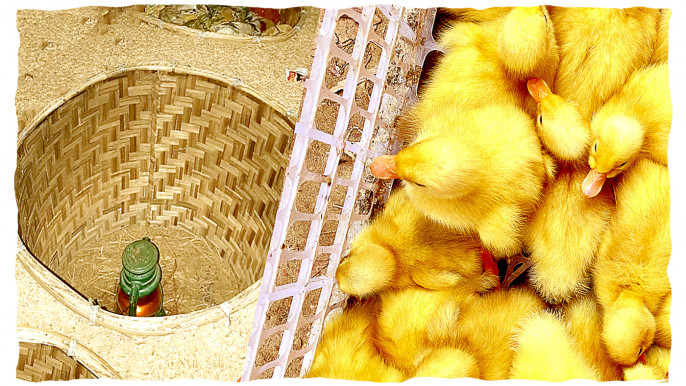In a quiet corner of Kothurikona village in Netrokona’s Madan upazila, Yasin Mia gently lifts a thick mattress in his tin-roofed hatchery. Beneath it, a lively group of ducklings chirps softly, warmed by rice husks and the glow of a kerosene lantern.
“These just hatched today,” he says proudly. “We call it the art of bringing life into the world.”
For Yasin, this art began out of necessity. Struggling to feed his seven-member family, he took a chance on his brother’s suggestion: hatch ducklings using a traditional method with rice husk and kerosene. He started with 1,000 eggs. Today, Yasin produces over 1.5 lakh ducklings every month, and even trains farmers as far as Meghalaya and Nepal.
A Simple, Low-Cost Method With Big Results
Across the floodplains of Netrokona, Sunamganj, and Habiganj, this age-old, low-tech method is creating economic opportunities for hundreds of families — with zero electricity or machines involved.
Here’s how it works:
- Fertilised duck eggs are cleaned, dried, and placed inside bamboo granaries packed with rice husk and covered with thick blankets.
- Kerosene lanterns are used to maintain warmth. They’re rotated in and out every 4 hours for 18 days.
- Eggs are then moved to a separate hatching bed for another 12 days.
- By Day 28 or 30 — the ducklings hatch.
From One Village to a Thriving Hub
Today, 180+ families in Kothurikona run full-time hatcheries. Locals now call it “Hatchery Palli” thanks to its massive daily output — over 90,000 ducklings per day.
Farmers here hatch several productive duck breeds including:
- Khaki Campbell (known for egg-laying)
- Jin Ding (highly productive)
- Indian Runner
- Beijing
The Economics: Low Cost, High Returns
Data from the Bangladesh Livestock Research Institute shows that:
- Households incubate 10,125 eggs per month
- Achieve a 70% hatching success rate
- Produce around 7,000 ducklings
- Monthly costs: approx. Tk 1.1 lakh
- Monthly income: approx. Tk 1.77 lakh
- Net profit: around Tk 66,000 (60% margin)
Prices vary slightly with the seasons — egg prices can rise to Tk 11.5 in winter and drop to Tk 9.5 in monsoon, but farmers continue to earn well.
Even smaller farms are doing great. A study by Sylhet Agricultural University found that:
- Small farms earn up to Tk 9,753/month
- Medium farms: Tk 13,667
- Large farms: Tk 14,346
- Smaller setups actually enjoy higher profit margins, up to 71.5%
Empowering Women & Keeping Youth at Home
This model is especially helpful for women and young people in rural areas.
Like Rabeya Akter from Derai in Sunamganj. She turned one room in her home into a hatchery and now produces 1,100 ducklings per month.
“This isn’t just about money,” she says. “It gives me freedom and purpose.”
The hatchery boom is also slowing down rural migration. Many young men who once moved to cities for work are now staying back to run family hatcheries.
Built on Tradition, Ready for Scale
Even infertile eggs that don’t hatch are now sold for food, adding around Tk 6,900/month in extra income for families.
Abdur Razzak, a hatchery owner in Habiganj, began with just 800 eggs and a borrowed lantern. Today, he gets regular orders from Cumilla, Barishal, and Chattogram.
But there’s still untapped potential. Most farmers operate on personal savings or informal loans.
“If we had access to affordable loans and proper training, we could easily double production,” says Razzak.
A Rural Revolution, Egg by Egg
What started in one household has now transformed the entire village. Kothurikona produces over 1 million ducklings every week, generating over Tk 2 crore a month in revenue. More than 85% of the population is now self-reliant thanks to hatchery-based livelihoods.
This rice husk-based technique proves that innovation doesn’t always mean high tech — sometimes, it just takes tradition, consistency, and a good idea.
👉 Download Eggora Poultry App: https://www.eggora.com/download-app
